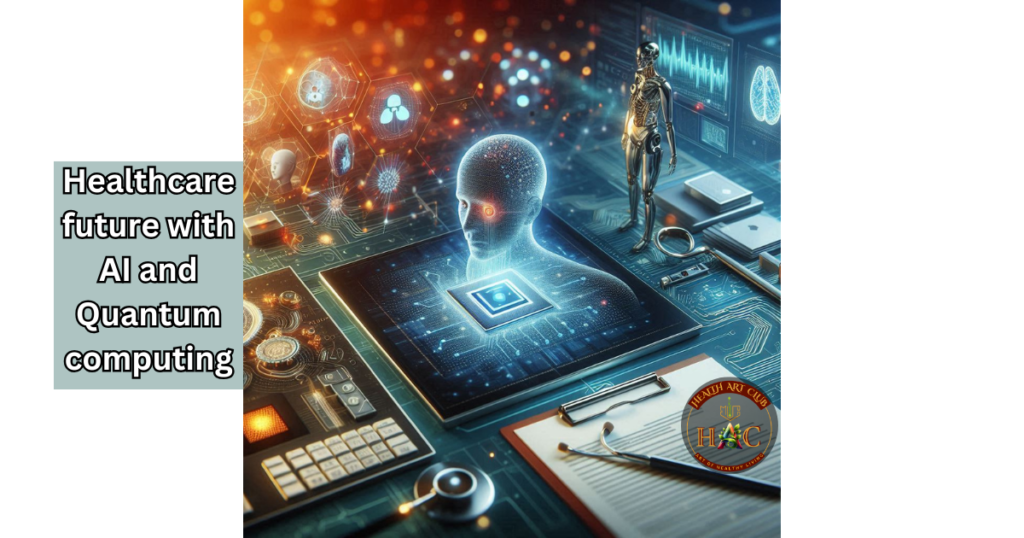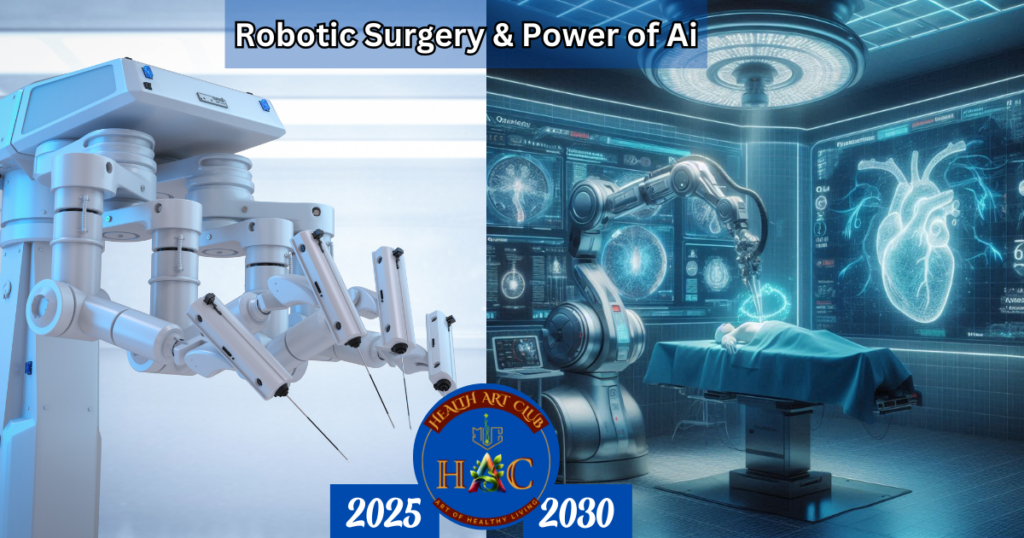Introduction
Imagine a world where illnesses are detected before symptoms appear, where treatments are personalized down to your genetic code, and where medical errors are nearly nonexistent. This is the promise of AI and quantum computing in 2030, especially after the latest announcement of Google’s quantum computer chip Willow. Together, they will deliver breakthroughs by 2030, according to analysis and research. These new technologies will transform all healthcare areas from testing to care delivery by working together. Look at how far medical care will evolve in the next decade and understand its benefits for you. Let’s dive into the transformative changes on the horizon and what they mean for you.

How Will AI Transform Medical Diagnosis Over The Next Few Years?
By 2030, AI’s fast data analysis will transform our current methods of detecting diseases. Medical imaging systems—from X-rays to MRIs—will scan images quickly to detect health risks before doctors identify them. AI technology will scan and compare genetic reports along with patient histories and lifestyle factors to recognize health risks ahead of any symptom development.
Real-Life Impact: Early Cancer Detection
By 2030, your annual health examination may include an artificial intelligence scanner that detects cancer in its earliest stage. Early medical treatment helps prevent millions of deaths while making patients healthier.
The future of healthcare will transform due to AI and Quantum computing technology
What Role Will Quantum Computing Play in Medical Research?
The research will speed up its process when using quantum technology (willow) to solve severe challenges such as finding new drugs and analyzing protein behavior. Unlike normal computers, quantum machines handle multiple calculations simultaneously to crunch through tasks faster than before, seconds that used to take years.
Accelerating Drug Discovery
Developing new medicines needs over 10 years of scientific work. By 2030, quantum computers will scan millions of chemical mixtures for study candidate selection in under one week. The process of therapy development could take shorter paths for people to receive benefits sooner.
Solving Genetic Mysteries
Quantum computers will assist scientists in studying chronic, untreatable diseases like Alzheimer’s and Parkinson’s through their genetic decryption processes. Our improved understanding will help us develop better ways to treat illnesses.
The Future of Robotic Surgery With Quantum Computers
Robotic surgery technology already delivers safer treatments with lower damage to patients through minimally invasive techniques. This combination of robotics and quantum computers will achieve surgery precision that nobody can foresee by the year 2030. Quantum computer chips, like Google’s Willow, can analyze surgery sensor data instantly for better safety outcomes and higher treatment results.
Practical Applications in Surgery
For example, quantum-powered robotics could help in removing cancerous tissues without affecting healthy cells. With this combination of technology, surgeons could make surgeries faster and recovery times shorter for patients.

How Will These Technologies Transform Patient Care?
With AI and quantum computing, healthcare will serve patients better while needing less staff and supplies to produce superior results. Patients will get enhanced personalizing care, improving accuracy, and increasing efficiency.
Personalized Treatment Plans
With AI tools, you can share your genetic and medical records and information about environmental factors to receive treatment plans just for you. Your doctor could use your personal response to medications when choosing treatment options. For example, medications could be selected based on how your body reacts to them.
Get your personalized, comprehensive health and wellness plan from our experts here.
AI-Powered Virtual Healthcare
By 2030, AI-driven assistants could handle simple tasks like answering questions, booking appointments, or offering mental health support. This would allow doctors to handle more challenging medical cases, thanks to these changes.
What Challenges Do AI and Quantum Computing Face in Healthcare?
While the potential is huge, medical use of these technologies remains distant because basic obstacles must be overcome first.
Data Privacy and Security
Using patient data within quantum systems and AI creates privacy risks. We need enhanced cybersecurity infrastructure that will safeguard precious personal information in healthcare settings.
Ethical Considerations
Integrating algorithms into healthcare requires us to define data ownership standards and establish proper algorithm usage controls to protect patients from misuse and biased systems.
High Costs and Accessibility
Modern quantum computers and quantum computer chips like Willow and artificial intelligence equipment require heavy financial investments. Businesses and governments need to partner up for the global distribution of new capabilities to ensure everyone gains from the benefits.
What Impacts Will This Technology Have on Healthcare Access?
AI and quantum computing could make healthcare more affordable and available to more people by cutting costs and extending services to remote areas.
Telemedicine Revolution
AI-based telemedicine systems will connect people in rural or faraway areas with doctors. Patients could receive diagnoses and treatments without having to travel long distances.
Affordable Treatments
More people across society will gain access to cheaper new treatments, as quantum computing helps researchers speed up drug development processes, particularly in low-income areas.
How Can You Prepare for the Healthcare Future?
By following news about AI and quantum technology, you can prepare for their expected changes in the healthcare system. Here’s how you can prepare:
- Keep Your Health Data Secure: Choose platforms and applications that place value on your personal data protection.
- Learn About New Tools: Stay up-to-date on current and emerging AI-powered medical technologies that medical facilities use.
- Support Fair Access: Support laws and policies that make advanced healthcare affordable for everyone.
Conclusion
Modern healthcare will transform by 2030 because AI and quantum computer chips, especially Google’s Willow, will let doctors find illness sooner while developing custom-made medical treatments. Advanced technologies will improve medical services at higher speeds while increasing precision and reaching more patients. The potential advantages stand tall despite present obstacles, including data safety and tool affordability.
Our future will come through with new technology that speeds up medical diagnosis results. Medical experts learn about fresh treatments to cure diseases every single day. Every community member, no matter how far from cities, can access top-quality medical services. We are moving step-by-step toward making this advanced medical era a reality. The big question is: Are you ready to explore how healthcare is changing with these new tools?
Read more about the role of artificial intelligence in healthcare transformation.
Read more about Google’s Willow here.
Frequently Asked Questions (FAQ)
1. How does AI help prevent medical errors?
AI looks at data carefully and reduces mistakes in diagnosing or treating patients by finding patterns human eyes may overlook.
2. Will these technologies replace doctors?
No. Quantum computers and AI technologies assist doctors in doing their work more effectively. These technologies will enable doctors to devote more effort to complex medical cases and engage with patient interactions.
3. Can quantum computing and Google’s Willow help cure cancer?
When combined with existing treatment techniques, quantum computers and chips (willow) detect faster solutions to heal medical conditions, but they do not treat illnesses on their own.
4. Are these technologies safe for patient use?
Yes, these systems can operate safely when careful testing and proper medical trials happen alongside strong rules that ensure their performance helps patients equally.
5. How can I benefit from AI-powered healthcare?
In the future, medical advances will help you receive a faster diagnosis while receiving more personalized treatment through expanded healthcare options while being in a long queue of waiting lists.
6. What is the biggest challenge for AI in healthcare?
The biggest challenge is keeping patient data private while making the technology fair and free from bias.
